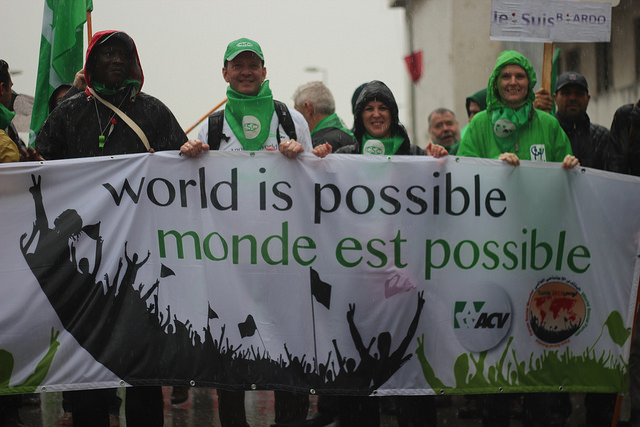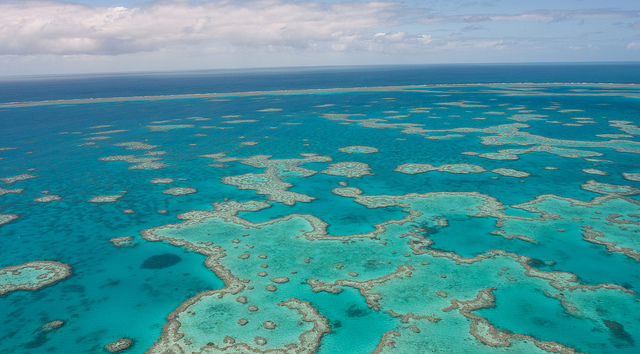Saturday 1st June 2019 marked a significant occasion for the degrowth movement: the inaugural ‘Global Degrowth Day’. Groups of people gathered together in places all around the world to engage with ideas of degrowth and alternatives to our growth-based society, guided by the event’s theme of ‘a good life for all’.
The Global Degrowth Day was coordinated by the Activists and Practitioners international working group of the degrowth movement, and arose through the merging of two previous events, the annual ‘Picnic for Degrowth’ day dating back to 2013, and a ‘Good Life For All’ day held in Germany in 2018.
The coordinators of the global event put out a call for people around the world to organise events in their communities, in whichever form they desired. A list of suggestions included picnics, movie screenings, discussions, and visits to local projects and organisations relevant to degrowth. The ambition of this global event was to bring together different people and organisations, as well as reaching out to new audiences, in order to help connect and build a diverse international degrowth movement, around values of ‘global justice, sustainability and well-being’. The coordination team have estimated that over 1000 people took part in this year’s Global Degrowth Day, across around 50 locations worldwide.
In the next part of this article, attendees of Global Degrowth Day events from four different international locations offer an insight into the activities which they took part in. These brief reports offer just a glimpse into what was undeniably a very successful first edition of the event. I begin with my own reflections.
Joe Herbert – Newcastle, UK
Our Global Degrowth Day events in Newcastle were organised by a local arts organisation,
the NewBridge Project, and took the form of a group tour of several local organisations operating outside the mainstream growth-driven economy.
Our group of around 20 people began the day at
George Street Social, a café, dry bar, and event space in Newcastle set up by recovering addicts. It was explained how 90% of the staff are in recovery, and that anyone in the city who is struggling can come and receive a free cup of tea and bowl of soup. Our host expressed joy at seeing people transform themselves after first coming to the space in a poor state.
We then moved onto
Star and Shadow, a co-operative DIY space and cinema. We learnt about the organisation’s non-hierarchical consensus decision-making processes, and its open ethic, whereby anyone can propose an event to hold in the space. Coincidentally, on this day, the space was also hosting a North East radical history event, evidencing the fruitful interaction of different radical ideas which the Star and Shadow facilitates.
Thirdly, we visited
the Comfrey Project across the Tyne river in Gateshead, which is a charity providing refugees and asylum seekers with a community space in which to engage in gardening, cooking and crafts. We had a tour of the garden, helped with planting and weeding, and were cooked a fantastic meal with produce from the site. After eating, the group did a round, each person saying what ‘goodness’ means to them.
To finish the day, we headed up the Tyne valley to a nearby woods, visiting a site of
Stomping Ground Forest School. With the guidance of the two women running the school, we foraged for wild garlic, made pots from wood, and cooked dinner on the camp fire. We were told about how the project seeks to reconnect children and adults with nature, as well as countering the more macho versions of bushcraft.
In sum, the day was hugely inspiring, as a result of both the amazing organisations we visited and the engaged group of attendees. We were reminded that a more just and sustainable society is already amongst us, and collectively we can help it to flourish further.
Ana Poças – Amsterdam, Netherlands
In the Netherlands, some of us from the
Dutch Degrowth Platform spent the Global Degrowth Day at the Food Autonomy Festival. There we joined our friends from Kritische Studenten Utrecht. The festival was at an agricultural area around Amsterdam, close to Schiphol Airport. The area, the Lutkemerpolder, is very beautiful and mostly used for agriculture, but it is threatened with eviction (not without resistance) because of plans to transform it into an industrial park.
At lunch-time we improvised a degrowth-discussion. Sheltered from the summer sun, under a small tent, we started debating. So, what is degrowth? GDP does not reflect wellbeing, but what can represent wellbeing? A story was shared of a French woman who fell in love with the relaxed and friendly culture of the Fiji islands and moved there. Even work was different. Every day at work she would laugh until she would cry!
How often do we laugh until we cry? How often do we laugh at all? With about 15 people, we took turns expressing views on degrowth: “for me it has to imply community-building”, “for me it’s about replacing the state”, “it’s not only about changing society, but changing ourselves as well”, “how do we unlearn so many things that make us part of individualistic consumerist societies?”, “how to change culture?”, “we need new narratives”.
New narratives are stimulated by having more and more of these discussions, inviting people who are outside of our bubble to imagine degrowth. What do we really need, personally, and as a society? How can we best provide this in low-material ways? We ended by reminding everyone to join the first Utrecht Degrowth Symposium on June 28th!
The rest of the day we enjoyed the rich programme of the festival, which included direct action training, a session of guerrilla gardening, a permaculture class, and great conversations around a delicious vegan dinner prepared by an action kitchen.
Joël Foramitti – Barcelona, Spain
In Barcelona, we celebrated the global degrowth day at the
L’Horta Alliberada, a little oasis in the neighbourhood of
Sants, where activists have occupied a vacant building lot and created an urban garden. Throughout the day, we enjoyed lots of sun, local food from the cooperative
Sana Delicia, talks and debates about degrowth, workshops on direct democracy and bookbinding, an open microphone for poetry, a concert by the band
Pitajaya, and a theatre performance about
Ende Gelände - an upcoming event of mass civil disobedience against fossil fuel extraction.
The day turned out to be a great opportunity for different collectives in Barcelona to meet, whom all focus on different topics like food and energy production, eco-feminism, climate activism, research, or tourism. The exchange of ideas inspired us to organise more meetings like this in the future to coordinate our efforts of the many different ways to work towards a more caring and sustainable society.
Álvaro Fonseca – Lisbon, Portugal
Our
Global Degrowth Day event in Lisbon was successful, joyful and convivial. Around 20 people attended the event, which involved a walk that started at a city garden (Gulbenkian Foundation), proceeded through a nearby neighbourhood (Campolide), with a visit to a local agroforestry project ('Bela Flor Respira') and then crossed the Alcantara valley and up through the Liberdade neighbourhood towards the Monsanto Forest Park, where we shared a picnic together. After lunch we had a lively conversation about degrowth, the climate emergency, the youth protests and Extinction Rebellion actions.
Conclusion
These vignettes are evidence of the convivial, inspiring and movement building activities that occurred as part of the 2019 Global Degrowth Day. For those who were not able to take part in the day this year, hopefully this article has inspired you to organise an event in your own town or city next year.
At this point, one would traditionally say ‘let’s make next year’s event bigger and better!’. But in the spirit of degrowth, let’s simply make sure that next year’s Global Degrowth Day is just as good.

